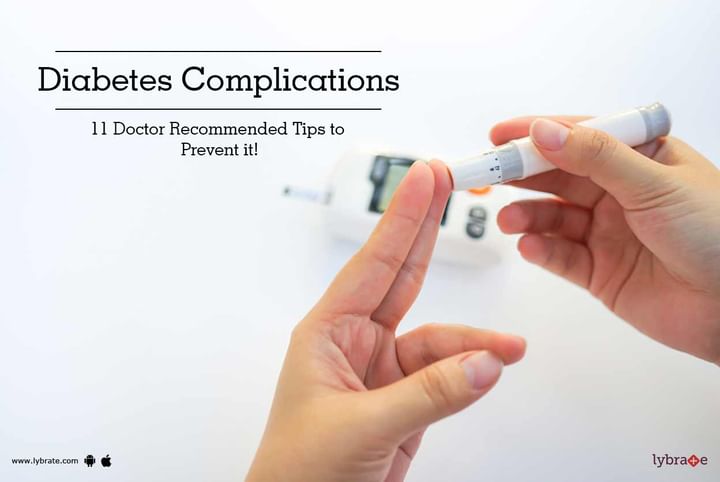Diabetes Complications - 11 Doctor Recommended Tips to Prevent it!
Diabetes occurs in all age groups, right from infants to the elderly. The greatest incidence of occurrences happen in the middle or older aged people. 80-85% cases belong to people of 45 years of age or older.
Whatever be your age, following lifestyle changes can ensure that you stay free of any complications.
1. Select your carbs carefully - Choose carbohydrates that break down in the body slowly, providing steady energy. Reach for whole grains, beans, nuts, and fresh vegetables and fruits. Yes, you can eat fruit even though it's sweet. It's about eating the right amounts of carbohydrates at each meal.
2. Lose weight - It'll help lower your blood sugar and improve your blood pressure and blood fats. You'll also have more energy. To begin with, try cutting excess fat, sugar, and calories from your diet.
3. Get enough sleep - Getting too much or too little sleep can increase your appetite and cravings for high-carb foods. That can lead to weight gain, increasing your risk for complications such as heart disease. Go for 7 or 8 hours of sleep every night. If you have sleep apnea, treating it can improve your sleep and lower your blood sugar levels.
4. Check your blood sugar periodically - Keep a track of your sugar levels can help you avoid diabetes complications, like nerve pain, or keep them from getting worse. Checking it can also help you see how foods and activities affect you, Your doctor can help you set a target glucose level range. The closer you get to your target, the better you'll feel.
5. Manage the stress effectively - Stress can cause your blood glucose levels to rise. Get rid of whatever physical or mental stress you have. Relaxation techniques such as breathing exercises, yoga, and meditation may be effective to control type 2 diabetes.
6. Salt - Reduce the salt in your diet. It may help lower blood pressure and protect your kidneys. Not salting the food on your plate may not be enough. Adults age 51 and older, and individuals with high blood pressure, diabetes, or chronic kidney disease should talk with their doctor about how much to reduce their sodium intake. In general, people with diabetes should decrease to less than 2,300 mgs per day, however, your doctor may recommend lower amounts.
7. Remove the risk of heart disease - Heart disease can be a serious diabetes complication. Keep an eye on your risk by getting these ABCs checked:
A1C level. This is a measure of your average blood sugar control for the last 2-3 months. You may need it checked two or more times a year. Talk to your doctor about setting a goal.
Blood pressure. Goal: below 140/80 mm Hg.
Cholesterol. Goal: LDL to 100 mg/d or less; HDL above 40 mg/dl in men and greater than 50 in women; and triglycerides below 150 mg/dl.
8. Take care of cuts and wounds - Diabetes raises your risk of infection and slows healing, so treat even simple cuts and scrapes quickly. Properly clean your wound and use an antibiotic cream and sterile bandage. See a doctor if it's not better in a few days. Check your feet every day for blisters, cuts, sores, redness, or swelling. Moisturize them to prevent cracks.
9. Mind your smoking habit - People with diabetes who smoke are two times more likely to die prematurely than those who don't. Quitting helps your heart and lungs. It lowers your blood pressure and risk of stroke, heart attack, nerve damage, and kidney disease.
10. Get your diet right! - Here's what is ideal:
- Upon waking : Bitter Gourd (karela) juice, and a glass of lukewarm water with half a freshly - squeezed lime.
- Breakfast: Any fresh fruit with the exception of bananas. A small quantity of wholemeal bread with butter and fresh milk.
- Lunch: A bowl of freshly prepared steamed vegetable, one or two whole wheat chapattis, and a glass of buttermilk.
- Mid afternoon: A glass of fresh fruit or vegetable juice
- Dinner: A large bowl of raw vegetable salad, with lime juice dressing, sprouted mung beans, and cottage cheese.
- Bedtime snack: A glass of fresh milk or fresh fruit
11. Doctor visit - Expect to see your doctor two to four times a year. If you take insulin or need help balancing your blood sugar levels, you may need to visit more often. Also, get a yearly physical and eye exam. You should be screened for eye, nerve, and kidney damage, and other complications. See a dentist twice a year.
Other measures:
- Exercise and yogic asanas. And Meditation
- Body massage and steam bath once a week
- Hot fomentation to lower back.
And be sure to tell all healthcare providers that you have diabetes. If you wish to discuss about any specific problem, you can consult an endocrinologist and ask a free question.



+1.svg)
